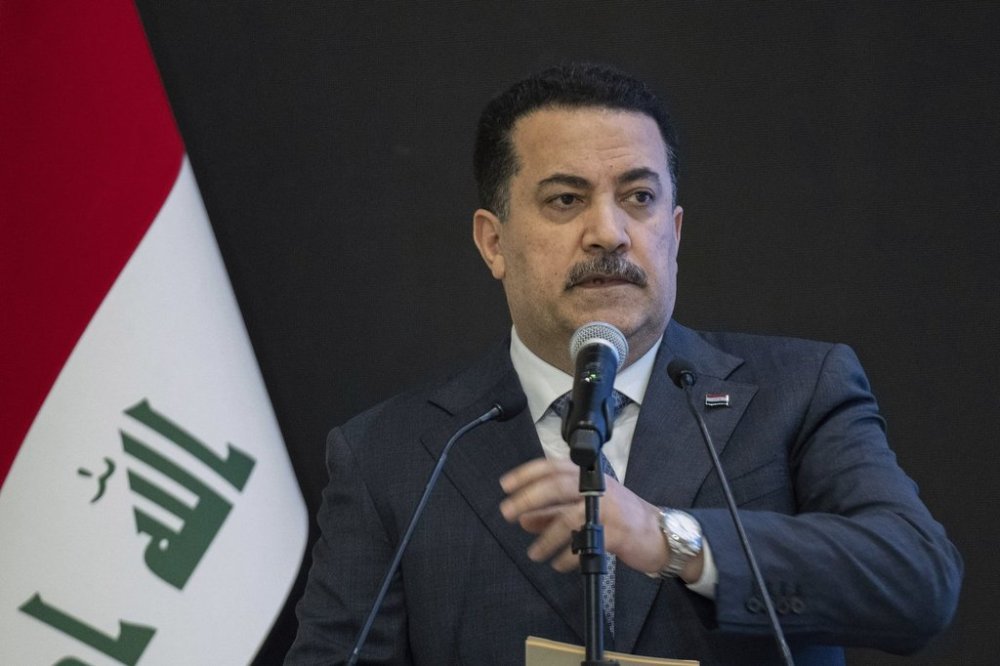Baghdad invites new Syrian president to a summit, sparking political division in Iraq
Advertisement
Read this article for free:
or
Already have an account? Log in here »
To continue reading, please subscribe:
Monthly Digital Subscription
$0 for the first 4 weeks*
- Enjoy unlimited reading on winnipegfreepress.com
- Read the E-Edition, our digital replica newspaper
- Access News Break, our award-winning app
- Play interactive puzzles
*No charge for 4 weeks then price increases to the regular rate of $19.00 plus GST every four weeks. Offer available to new and qualified returning subscribers only. Cancel any time.
Monthly Digital Subscription
$4.75/week*
- Enjoy unlimited reading on winnipegfreepress.com
- Read the E-Edition, our digital replica newspaper
- Access News Break, our award-winning app
- Play interactive puzzles
*Billed as $19 plus GST every four weeks. Cancel any time.
To continue reading, please subscribe:
Add Free Press access to your Brandon Sun subscription for only an additional
$1 for the first 4 weeks*
*Your next subscription payment will increase by $1.00 and you will be charged $16.99 plus GST for four weeks. After four weeks, your payment will increase to $23.99 plus GST every four weeks.
Read unlimited articles for free today:
or
Already have an account? Log in here »
Hey there, time traveller!
This article was published 23/04/2025 (230 days ago), so information in it may no longer be current.
BAGHDAD (AP) — An official invitation to new Syrian President Ahmad al-Sharaa to attend the upcoming Arab League summit in Baghdad has triggered sharp political divisions within Iraq.
Al-Sharaa took power after leading a lightning rebel offensive that unseated his predecessor, Bashar Assad, in December. Since then, he has positioned himself as a statesman aiming to unite and rebuild his country after nearly 14 years of civil war, but his past as a Sunni Islamist militant has left many — including Shiite groups in Iraq — wary.
Formerly known by the nom de guerre Abu Mohammed al-Golani, al-Sharaa joined the ranks of al-Qaida insurgents battling U.S. forces in Iraq after the U.S.-led invasion in 2003 and still faces a warrant for his arrest on terrorism charges in Iraq.

Prime Minister Mohammed Shia Al-Sudani confirmed last week that Iraq had extended a formal invitation to al-Sharaa to attend the May 17 summit, following a previously unannounced meeting between the two in Qatar. Al-Sharaa has not confirmed plans to attend.
Iraq, which has strong ties with both the United States and Iran, has sought to position itself as a regional mediator. It hosted talks between regional rivals Iran and Saudi Arabia before they reached a deal to normalize relations.
Many Iraqi and regional stakeholders see the invitation to al-Sharaa as an opportunity to bolster Baghdad’s image as a hub for regional diplomacy.
However, strong opposition to al-Sharaa’s invitation has emerged from powerful Shiite factions aligned with Iran. Tehran, which backed Assad in Syria’s civil war and used Syria as a conduit to smuggle weapons to the Hezbollah militant group in Lebanon, was widely seen as the biggest loser from Assad’s ouster.
Several Iraqi Shiite militias fought alongside Assad’s forces during the civil war that followed his brutal crackdown on pro-democracy protests in 2011, making al-Sharaa a particularly sensitive figure for them.
Mustafa Sand, a member of parliament from the Coordination Framework — a coalition of Iran-allied factions that brought al-Sudani to power in 2022 — said in a video posted on X, formerly Twitter, that the foreign ministry had reached out to Iraq’s Supreme Judicial Council to verify whether an arrest warrant was issued against al-Sharaa and that the council had confirmed the existence of a valid warrant.
A security official who spoke on condition of anonymity because he was not authorized to comment publicly confirmed the existence of the warrant to The Associated Press.
The Islamic Dawa Party, led by former Prime Minister Nouri al-Maliki — one of the most influential figures in Iraq’s ruling coalition — called on the government in a statement to “ensure that any summit participant has a clean judicial record, both locally and internationally,” adding, “The blood of Iraqis is not cheap, and those who have violated their sanctity or committed documented crimes against them should not be welcomed in Baghdad.”
A spokesperson for the powerful militia Kataib Hezbollah, Abu Ali Al-Askari, said in a statement, “Arab summits have been held without President Assad, Iraq, or Libya. They certainly won’t stop because the criminal Abu Mohammad al-Golani … isn’t attending.”
On the other side, Sunni political factions have rallied to defend al-Sharaa’s inclusion in the summit. Former MP Dhafir Al-Ani, a prominent Sunni figure, said he supports Baghdad’s attempts to build ties with the new Syrian authorities.
“Preventing his presence would be a stab in the heart of the Iraqi government and a sign that violence still dictates the country’s fate,” he said.
The Iraqi government has not responded publicly to the backlash.
A warrant would not necessarily block al-Sharaa from joining the summit. Other countries have chosen to waive similar measures. In December after Assad’s fall, the United States said it had decided not to pursue a $10 million reward it had previously offered for al-Sharaa’s capture, although Washington also has not yet officially recognized the new Syrian government.
However, observers said the controversy highlights deep divisions within Iraq’s political system and underscores the challenges facing national reconciliation efforts.
“Some see welcoming al-Sharaa as an insult to the memory of Iraq’s victims, while Sunni factions view his participation as a political victory,” said political analyst Munaf Al-Musawi, head of the Baghdad Center for Strategic Studies. “This could risk fueling sectarian tensions.”

